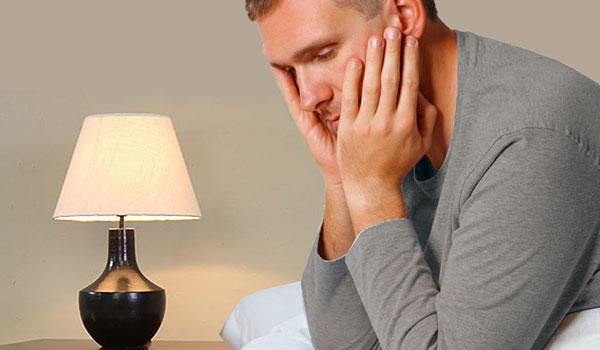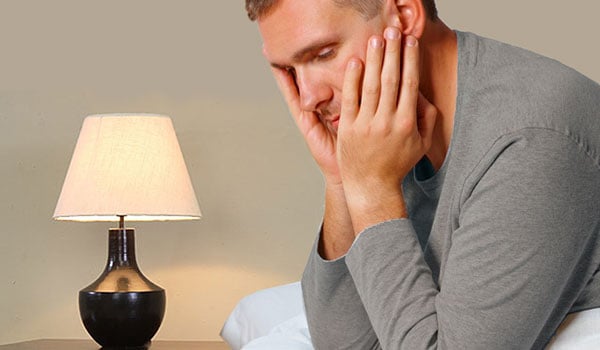
Ask the Flight Surgeon / By Dr. (LTC) Joseph Puskar: Question: I’ve been having a hard time sleeping the past two months, and feel fatigued most days now. What can I do to get some decent sleep?
FS: Chronic insomnia affects approximately 10-15% of the U.S. population. It is defined as difficulty initiating or maintaining sleep, or non-restorative sleep for longer than one month resulting in impairment such as cognitive dysfunction and irritability. Advancing age, and medical conditions such as chronic pain, shortness of breath, heart conditions, polypharmacy, and low socio-economic status are considered risk factors. Mental health conditions can be both a cause of, and result from insomnia and chronic sleep deprivation in more severe cases. While depression can make it difficult to sleep, it can also be a result of insomnia, so we should not automatically assume depression to be the cause in all cases associated with depression. Sleep apnea can result in insomnia and chronic fatigue, but unless obesity, snoring, and witnessed apneic events causing wakening are seen, a sleep study is not routinely indicated to look for obstructive sleep apnea.

Methods
Try to regularize sleep and wake times, avoid caffeine intake especially after noon, limit daytime napping, create a dark and quiet sleep environment, and avoid looking at the clock at night. These traditional behavioral techniques or sleep hygiene methods help in approximately 40% of cases. If unable to fall asleep or get back to sleep for more than an hour, try to get up and read, or do crossword puzzles or crafts for an hour or two until drowsy, and then return to bed. Before the advent of artificial lighting people commonly had a diurnal sleep pattern; Shakespearean literature refers to the first and second sleeps; both were of approximately three and a half to four hours in duration, and broken by a few hours of light outdoor work or indoor crafts. Avoid screen time before bed as much as possible, but if late night computer use is operationally necessary, try downloading f.lux for video screens. This program uses yellow light for the background illumination, and automatically adjusts screen light with the local time. The soft yellow-red spectrum does not have the melatonin-suppressive effect that standard blue spectrum video screen light does, thus making it easier to fall asleep quickly and sleep longer for late night computer and video game aficionados.
Other Techniques
Sleep restriction can ironically be a powerful tool to reset the circadian rhythm and get back to a normal, restorative sleep pattern. Many people with insomnia spend too much time in bed simply tossing and turning. If only getting three or four hours’ sleep a night, try going to bed later than normal, and getting up earlier: go to bed at 11 PM and get up at 4 AM for example, and no napping the next day! Oftentimes, just one night of this is enough to get you sleeping soundly again. If not, gradually increase your sleep time 10-15 minutes on either end until sleeping your normal amount again. These cognitive-behavioral therapy techniques combined with sleep hygiene are effective 70% to 80% of the time, and they work regardless of the cause of insomnia.
Sleep Aids
Pharmacologic sleep aids such as Ambien (approved for use in flyers), the anti-depressant medication trazodone, and benzodiazepines like alprazolam (not approved for flight) can help for short-term use, but should be considered a last resort, especially for personnel on flight status. They can, however be helpful in the short-term, particularly if there is a co-morbid condition such as depression or adjustment disorder, and are now being somewhat underused by many clinicians due to concerns over long-term adverse health effects such as an increase in sudden death rates with Ambien use.
The human brain is essentially a massively parallel, electro-chemical, biological computer that cannot operate in the wake mode continuously. It needs time to rest, re-boot, rebuild, and heal with good sleep. Functional MRI studies show that the neurons in the brain physically contract about one third of their ordinary volume during the rapid eye movement and deeper dream states of sleep thus allowing an increase in cerebrospinal fluid flow over them that physically washes out toxic products of metabolism. Buildup of these toxins explains a lot of the cognitive decline seen in sleep deprivation, and over long periods of time can be a risk factor for dementia. Although this is true, and most people need seven or eight hours of sleep a night to maintain peak performance, most can also maintain reasonable function on as little as six for short periods of time up to a few weeks, and no untoward physical or mental health problems are likely to develop over the short term. Try some of these techniques if you’re having difficulty sleeping, and see your flight surgeon if the insomnia continues.
Question for the Flight Surgeon?
If you have a question you would like addressed, email it to This email address is being protected from spambots. You need JavaScript enabled to view it.; we’ll try to address it in the future. See your unit flight surgeon for your personal health issues.The views and opinions offered are those of the author and researchers and should not be construed as an official Department of the Army position unless otherwise stated
Dr. (LTC) Joseph Puskar is a flight surgeon and the director of the Army Flight Surgeon Primary Course at the US Army School of Aviation Medicine at Fort Rucker, AL










